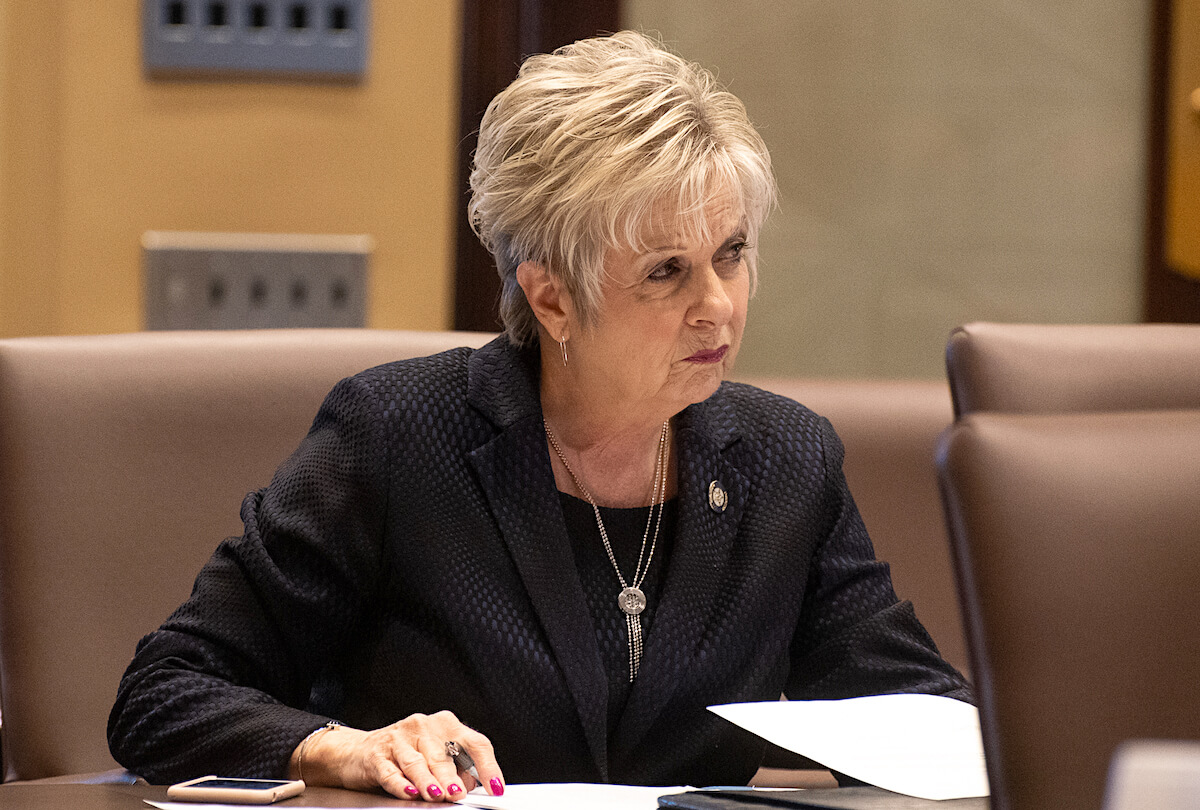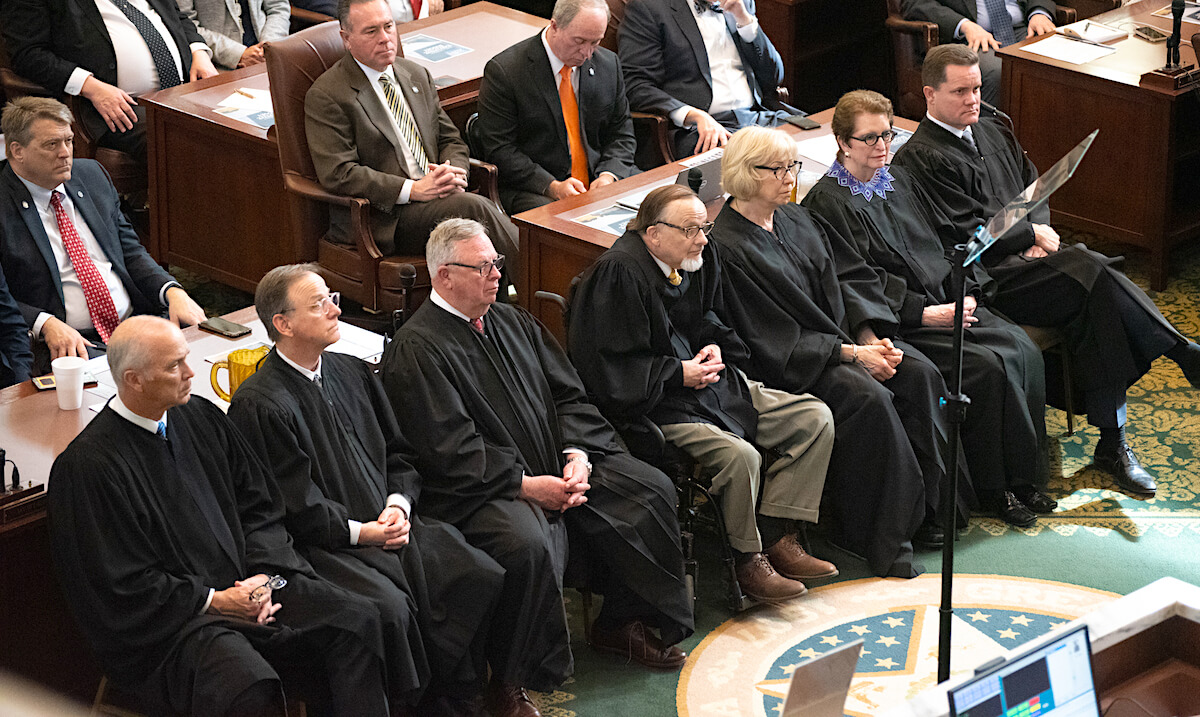
(Update: Lawmakers eventually decided May 15 to approve a 4.5 percent pay raise for state judges and district attorneys. The Senate also advanced a measure adjusting the Legislature’s obligation to consider a judicial pay raise, but the House voted down that change.)
The Oklahoma Legislature sent its general appropriations bill and a slew of other finance-related measures to Gov. Kevin Stitt on Thursday, but lawmakers have pushed pause on their pending decision about a judicial pay raise that has become controversial in the wake of 4 percent budget cuts across most state agencies.
In September when the state’s financial outlook for Fiscal Year 2021 seemed positive, an obscure entity called the Board on Judicial Compensation recommended a 9.23 percent pay increase for judges across all levels of Oklahoma’s state court system. A statutory body, the Board on Judicial Compensation makes a recommendation every two years, and the Oklahoma Legislature faces three options: take no action and watch the pay raise take effect, modify the amount of the pay raise or reject it outright.
When legislative leaders took up a dozen of their budget-related bills May 4 in Joint Committee on Appropriations and budget meetings, SB 1931 authorized only a 4.5 percent pay raise for state judges. The House JCAB voted 28-1 to advance the measure, but the Senate JCAB moved it forward more narrowly 12-9.
“I don’t think this is the time to do this. We’ve got thousands upon thousands of Oklahomans who are unemployed,” said Senate Judiciary Committee Chairwoman Julie Daniels (R-Bartlesville) in debate against the proposal May 4. “We are not obligated to provide this raise. I was opposed to it from the beginning. They already had a raise a couple years ago.”
Senate Appropriations and Budget Chairman Roger Thompson (R-Okemah) carried the measure and debated in favor of it as a “compromise” that day. But 48 hours later, Thompson said his perspective on the situation had been modified and that SB 1931 was on hold.
“We’re definitely talking about it,” Thompson said Wednesday.
The Senate appropriations leader referenced the issue’s complexity. The salaries of Oklahoma’s 27 district attorneys are tied to judicial pay. DA’s receive 95 percent of any pay hike for the judiciary, even if the District Attorneys Council budget is trimmed for the same fiscal year — as is the case in the FY 2021 general appropriations bill.
“I was taken to school on this bill, for one thing. I was hoping that (money) would get to the DA’s and help them because if you give the judges a raise, they get a raise,” Thompson said. “But I talked to (District Attorneys Council director) Trent Baggett [Tuesday], and he sent me an attorney general’s opinion that if we allow the entire 9.23 percent to go, then it would automatically go to the DA’s. But now since we have modified it, it’s after the next election cycle before they are going to get any money.”
Thompson said that means district attorney offices would not receive immediate relief unless the entire 9.23 percent recommended raise goes through.
“So we are holding up on the bill to see what we are going to do,” Thompson said. “It’s not something we are pushing forward on judicial raises. It’s not really the time to do that. But I do want to make sure the courts are funded.”
Like Thompson, House Minority Leader Emily Virgin (D-Norman) wants to see courts funded. She debated against the general appropriations bill Thursday, arguing that Gov. Kevin Stitt and the Legislature should be working more closely together to avoid cutting valuable state services during a pandemic.
Virgin had voted Monday to advance the 4.5 percent judicial pay raise bill, but during a videoconference press availability Wednesday, she said the House Democratic Caucus had pumped its brakes on the topic.
“We are re-evaluating as a caucus where we want to be on that bill,” Virgin said. “We do have some concerns about not just the amount of money but also what message it sends to people that some core services are being cut right now but that judges would receive a raise. So we talked about that in caucus [Tuesday]. I think our position may change when that bill comes to the floor.”
Thompson’s comments indicate that “when” may be an “if.”
“The bill as it stands today, if it passes they get 4.5 percent. If we don’t do anything, they get 9.23 percent,” he said. “We’ve got to come back and either disallow it altogether — we’ve got to take action.”

Judicial compensation drama has background
Oklahoma’s judiciary received a pay increase of more than 6 percent the last time the issue was up for review by the Board on Judicial Compensation. But that process went even less smoothly than this year’s.
Focused on passing a historic revenue bill and the subsequent April teacher walkout, lawmakers functionally failed to realize the decision before them. The 6 percent raise took effect, and when the Legislature returned for 2019, one of the first fiscal items they had to pass was a $2.5 million supplemental appropriation to help the court system pay for the raises.
At the time, Thompson was so frustrated by the fact that the Board on Judicial Compensation had not directly notified legislative leaders of its raise recommendation, he passed a law requiring the board to inform the governor and Legislature of its actions.
“The appropriation chairmen were not notified of the raises,” Thompson told NonDoc in 2019. “Maybe we won’t get caught by surprise again.”
‘So many people are out of work and struggling’

At least person surprised by the Legislature potentially moving forward with the judicial and district attorney pay raises has been calling the Capitol to advocate against his own financial interest: Oklahoma County District Attorney David Prater.
“There’s no way in the world that any elected official, including state judges, should get a raise during this budget crisis,” Prater told Sean Murphy of the Associated Press. “Especially when so many people are out of work and struggling right now.”
Prater told the AP that raising judicial and DA pay this year would be “unconscionable.” He declined further comment to NonDoc on Thursday, but he did express concern for mental health funding and other state services intended to support those needing help.
Sen. Michael Brooks (D-OKC) supports those types of services also, but in Monday’s Senate JCAB meeting, he voted in favor of SB 1931’s proposed 4.5 percent raise.
“It seemed like it was a compromise that was made among all parties involved, and I think really it’s up to leadership to come up with a budget,” said Brooks, one of only four practicing attorneys in the Oklahoma Senate. “I think it’s important to be able to retain judges. I will acknowledge that this is a bad year.”
Brooks said pay levels affect the state’s ability to retain judges, who can often make substantially more money in private or group practice.
“Ultimately, I think experience builds a judicial temperament that helps to be able to make sure the justice system flows smoothly,” Brooks said.
Tony Sellars, who served two cycles on the Board on Judicial Compensation, agreed with Brooks.
“I think it has merit to evaluate where we are in the region, where we are nationally and make sure we are making a best effort to attract the brightest minds to sit on our courts,” Sellars said. “I think it’s more important every day because everybody seems litigious. We need people with the credentials and the experience to be sitting in these positions.”
Sellars recalled voting for pay raises in both of his Board on Judicial Compensation terms, though he also recalled the feeling of having the Legislature reject the proposal when state budgets were struggling.
“It’s tough any time,” Sellars said. “It’s tough when you talk about giving the legislators a raise, and it’s tough when you talk about giving judges a raise.”
As legislators debate what to do with the pending judicial raise decision, they are also receiving attention of their own for a scheduled pay raise after the 2020 election. Unlike the judicial pay raise, however, legislators have no authority to deny or modify changes in their pay, which is set every two years by the Board on Legislative Compensation. That board cut lawmaker pay in 2017 but then voted in October 2019 for a substantial increase from $35,021 to $47,500.
Asked about pay issues at a press conference Wednesday, Gov. Kevin Stitt declined to join the compensation conversation.
“We’re going through the budget. I’m not going to make any specific comments on whether legislators should get raises or the judicial should get raises,” Stitt said. “We are going to review all of that.”
Oklahoma judicial pay scale in statute
The following judicial salaries appear in the state statutes linked to the respective court, but the actual salaries of judges are higher under the language that each statute opens with: “Except as otherwise provided by the Board on Judicial Compensation.”
The statutory minimums are:
- Supreme Court chief justice: $155,820
- Supreme Court associate justice: $145,914
- Court of Criminal Appeals presiding judge: $151,034
- Court of Criminal Appeals judge: $145,914
- Court of Civil Appeals presiding judge: $140,795
- Court of Civil Appeals judge: $138,235
- District Court judge: $102,529
- District Court associate judge: $94,839
- Special judge: $87,150
A 2013 editorial from The Oklahoman listed district court judge pay at $124,000. Information from Oklahoma Watch’s data site shows special judges earning $135,566.
(Update: This story was updated at 7:45 a.m. Saturday, May 9, to include additional information about judicial salaries.)





















